At This New Jersey Farm, Alpacas Help the Mentally Ill
At Fountain House Farm, members with mental illness recover and gain new skills, find jobs, and make lasting friendships.
At This New Jersey Farm, Alpacas Help the Mentally Ill
At Fountain House Farm, members with mental illness recover and gain new skills, find jobs, and make lasting friendships.
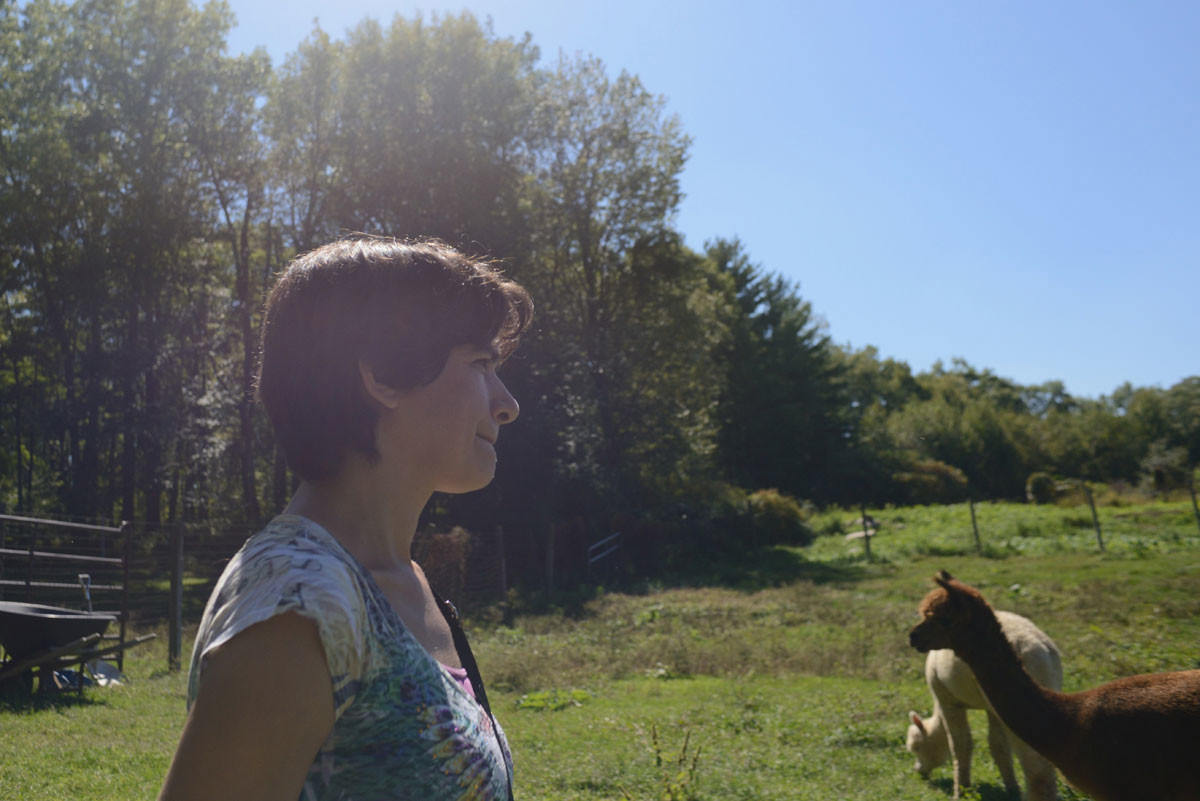
“I understand the animals can be stereotyped just like I was stereotyped,” says Ford, 28, who helps care for the pack of alpacas who call Fountain House Farm at High Point home. Ford finds comfort in the animals. They’re more like gentle pets than wild beasts, she says.
The farm in rural Montague, New Jersey, is part of Fountain House, a New York City-based organization dedicated to helping members with mental illness recover and gain new skills, find jobs, and make lasting friendships. It’s a place that helps further the organization’s mission by giving members a place for mindfulness and a space to learn new skills. Ford has been a member for two-and-a-half years and stays at the farm for about a week a month. “Coming to Fountain House and having people give you a hug, and not call you crazy, and love you is the same as me going to that barn and feeding [the alpacas] and not being afraid,” she says.
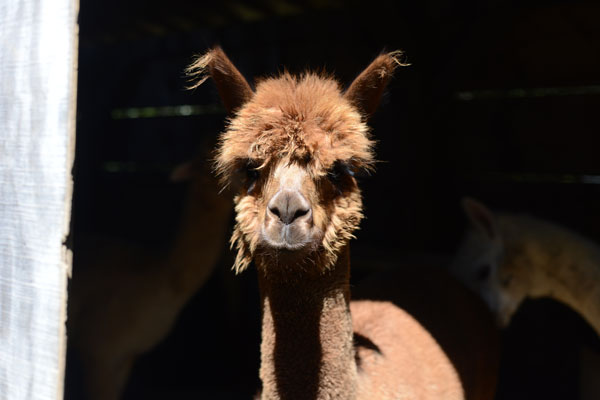
At the farm, members feed and water the alpacas regularly and perform basic veterinary care, while supervised by staff. Both the animals and the members benefit from the socialization. The animals are easily managed and stay calm, and, according the Fountain House’s president Kenn J. Dudek, “People spending time with animals, particularly for people who have schizophrenia, is a very useful process. Sometimes people can’t relate to people well, but animals are a little bit easier.”
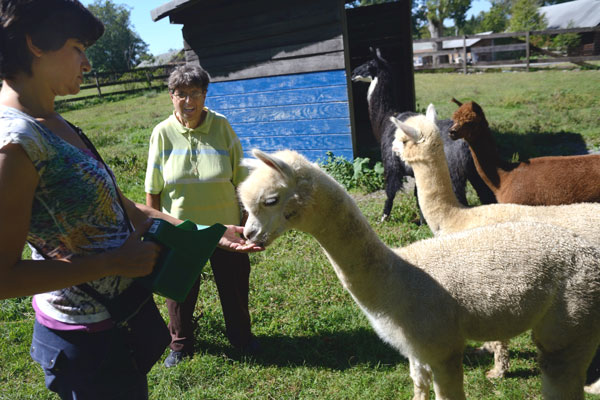
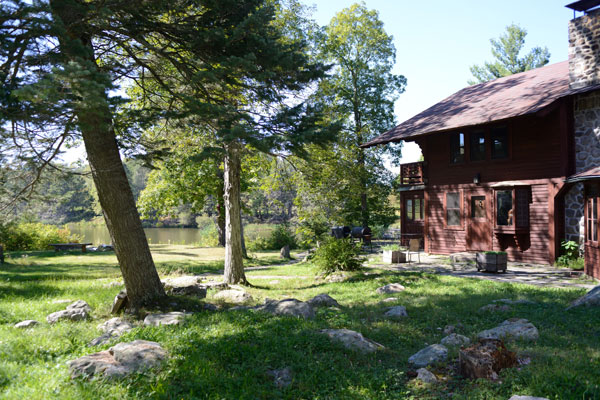
Along with the farm’s 14 alpacas, the 447-acre parcel of land consists of vegetable gardens, an orchard, a 10-acre lake, miles of forest, and a chalet to house members and staff. The farm was a gift from a family whose mentally ill son found solace in the tranquil spot. All members visit the farm; some for day visits or just a few weeks a year. Others, likes Ford, take an active role in the farm’s day-to-day work.
Although the farm has been part of the organization since the 1970s, it wasn’t until Dudek started in the 1990s that alpacas were incorporated.
At a time when alpacas could fetch thousands of dollars in sales, the animals were purchased by Fountain House to breed and sell, and the staff entered them into shows and competitions, which helped increase sales. Around 2008, when the breeding market faced a downturn, the organization turned to selling the alpacas’ fiber to ensure the animals’ financial viability.
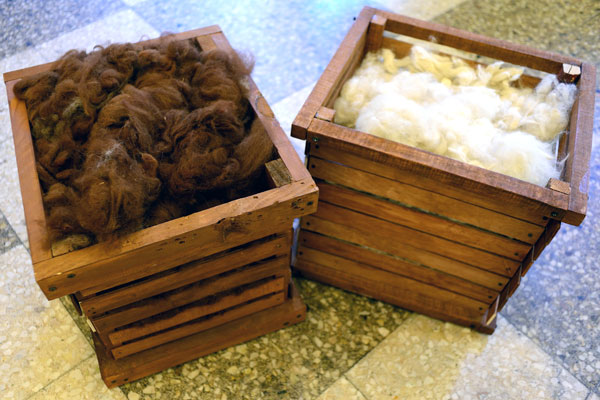
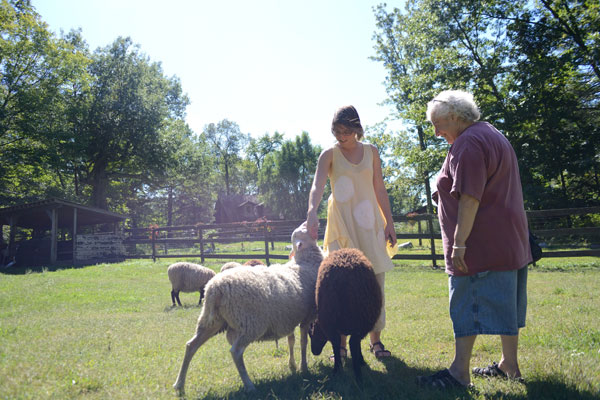
The farm now works with a local co-op that spins the fiber and creates garments, some of which the organization has sold at the Fountain House gallery, at the organization’s headquarters in Manhattan. Recently the farm has introduced Finnish sheep to the brood, so that they can add their fiber, or fleece, to the yarn. Fountain House staff are also teaching members to spin the fiber themselves.
Aliza Koszuk, 48, a new member and avid crocheter, is planning on learning to hand spin. At the farm on a recent weekday, she was part of a small group of members who had driven up from Manhattan to pick apples for cider, and afterward, she fed the alpacas. It was only her second time visiting the farm and feeding the animals, but she was already showing another member where to find their food and the describing the best way to compel the often nervous creatures to approach.
After years of hospitalization for her bipolar disorder, Koszuk says she is “trying to build a life for myself that’s valued. I’m trying to fill my life with things that I love,” including nature and animals. “I foresee myself spending a lot of time here.”
Follow us

This work is licensed under a Creative Commons Attribution-NoDerivatives 4.0 International License.
Want to republish a Modern Farmer story?
We are happy for Modern Farmer stories to be shared, and encourage you to republish our articles for your audience. When doing so, we ask that you follow these guidelines:
Please credit us and our writers
For the author byline, please use “Author Name, Modern Farmer.” At the top of our stories, if on the web, please include this text and link: “This story was originally published by Modern Farmer.”
Please make sure to include a link back to either our home page or the article URL.
At the bottom of the story, please include the following text:
“Modern Farmer is a nonprofit initiative dedicated to raising awareness and catalyzing action at the intersection of food, agriculture, and society. Read more at <link>Modern Farmer</link>.”
Use our widget
We’d like to be able to track our stories, so we ask that if you republish our content, you do so using our widget (located on the left hand side of the article). The HTML code has a built-in tracker that tells us the data and domain where the story was published, as well as view counts.
Check the image requirements
It’s your responsibility to confirm you're licensed to republish images in our articles. Some images, such as those from commercial providers, don't allow their images to be republished without permission or payment. Copyright terms are generally listed in the image caption and attribution. You are welcome to omit our images or substitute with your own. Charts and interactive graphics follow the same rules.
Don’t change too much. Or, ask us first.
Articles must be republished in their entirety. It’s okay to change references to time (“today” to “yesterday”) or location (“Iowa City, IA” to “here”). But please keep everything else the same.
If you feel strongly that a more material edit needs to be made, get in touch with us at [email protected]. We’re happy to discuss it with the original author, but we must have prior approval for changes before publication.
Special cases
Extracts. You may run the first few lines or paragraphs of the article and then say: “Read the full article at Modern Farmer” with a link back to the original article.
Quotes. You may quote authors provided you include a link back to the article URL.
Translations. These require writer approval. To inquire about translation of a Modern Farmer article, contact us at [email protected]
Signed consent / copyright release forms. These are not required, provided you are following these guidelines.
Print. Articles can be republished in print under these same rules, with the exception that you do not need to include the links.
Tag us
When sharing the story on social media, please tag us using the following: - Twitter (@ModFarm) - Facebook (@ModernFarmerMedia) - Instagram (@modfarm)
Use our content respectfully
Modern Farmer is a nonprofit and as such we share our content for free and in good faith in order to reach new audiences. Respectfully,
No selling ads against our stories. It’s okay to put our stories on pages with ads.
Don’t republish our material wholesale, or automatically; you need to select stories to be republished individually.
You have no rights to sell, license, syndicate, or otherwise represent yourself as the authorized owner of our material to any third parties. This means that you cannot actively publish or submit our work for syndication to third party platforms or apps like Apple News or Google News. We understand that publishers cannot fully control when certain third parties automatically summarize or crawl content from publishers’ own sites.
Keep in touch
We want to hear from you if you love Modern Farmer content, have a collaboration idea, or anything else to share. As a nonprofit outlet, we work in service of our community and are always open to comments, feedback, and ideas. Contact us at [email protected].by Gloria Dawson, Modern Farmer
September 24, 2015
Modern Farmer Weekly
Solutions Hub
Innovations, ideas and inspiration. Actionable solutions for a resilient food system.
ExploreExplore other topics
Share With Us
We want to hear from Modern Farmer readers who have thoughtful commentary, actionable solutions, or helpful ideas to share.
SubmitNecessary cookies are absolutely essential for the website to function properly. This category only includes cookies that ensures basic functionalities and security features of the website. These cookies do not store any personal information.
Any cookies that may not be particularly necessary for the website to function and are used specifically to collect user personal data via analytics, ads, other embedded contents are termed as non-necessary cookies.
I would like to visit the farm. I moved to sussex county recently…i am on SSD for BPD (mixed episode bipolar disorder) and anxiety/depression…i am often emotionally disabled
I love farms and animals…i am a dog/cat groomer…schooled and seasoned…very depressed….i need therapy but cant afford a therapist but animals are my true therapy. I need to br around more animals to build up my self esteem and stop feeling sorry for myself…i can help around the farm…i am smart and competent…please let me know if and when i can drive up and visit